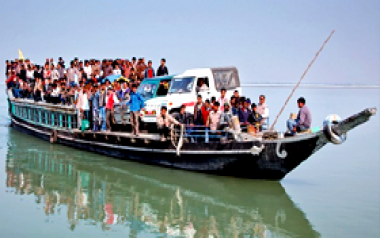HT Digital
Thursday, October 10: To address growing safety concerns in Lakhimpur district, the District Magistrate, Lachit Kumar Das, has issued a prohibitory order aimed at preventing accidents caused by overloaded ferries and unsafe boat operations. The overloading of ferries at various river ghats in the district has reached a hazardous level, raising fears of potential accidents that could result in the loss of human lives, animals, and property. Furthermore, it has been observed that many ferries in the district are operating without the installation of marine engines, increasing the risks to passengers and operators alike.
This growing threat to public safety has prompted the District Magistrate to take immediate action. Exercising the powers granted to him under Section 163 of the Bengal Nuisance Suppression Act (BNSS), Lachit Kumar Das issued a prohibitory order through a notification (No. E-87498/DFA/310018 dated 08/10/2024). The order prohibits the operation of ferries or boats without properly installed marine engines. Ferries currently operating with automated engines, which are deemed unsafe, have been flagged as potential hazards that could lead to accidents, including capsizing.
The prohibitory order also sets strict limits on the number of passengers and vehicles ferries are allowed to carry. Specifically, the new regulations restrict the number of passengers to a maximum of 100, and no more than 10 motorbikes can be transported at any one time. These restrictions apply to ferries covering a distance of 18 to 20 meters, which are typical operations at various ghats across the district. Any ferry found in violation of these restrictions will be subject to punishment under Section 223 of the BNSS and other relevant legal provisions.
This move comes in response to rising concerns among local authorities about ferry operations becoming increasingly dangerous due to overloading and inadequate safety measures. Ferries serve as a critical mode of transportation for residents and goods in the region, especially in areas that rely on river crossings as a primary route. However, lax regulations and poor enforcement have resulted in unsafe practices, such as loading ferries far beyond their capacity or operating boats without proper engines, which are necessary for maintaining stability and control in strong currents.
In recent months, local authorities have received several complaints about unsafe ferry operations, raising alarms about the potential for major accidents. These concerns have been further aggravated by reports of ferries being operated without marine engines, a practice that increases the likelihood of capsizing, particularly during the monsoon season when river currents become more volatile.
The District Magistrate’s office has emphasized that the new restrictions are not meant to hinder the essential services provided by ferry operators but rather to protect the lives and property of passengers and operators. With the introduction of these measures, authorities hope to minimize the risk of accidents, fatalities, and property damage while maintaining safe and efficient ferry services.
The public has been urged to cooperate with the new rules to ensure their safety during ferry crossings. Local ferry operators have been instructed to comply with the regulations immediately and make the necessary adjustments to their operations, including installing marine engines where required. Authorities will be closely monitoring ferry operations in the district to ensure that the new safety standards are met.
In addition to these measures, the district administration has pledged to work with local law enforcement and regulatory bodies to ensure strict enforcement of the prohibitory order. Those found violating the order will face legal consequences, as outlined under the BNSS and other applicable laws.
By taking this step, Lakhimpur’s district authorities aim to prevent further tragedies and ensure that ferry services in the region operate safely and efficiently. The order is expected to remain in effect until safety standards are met and risks to public safety have been adequately addressed.







